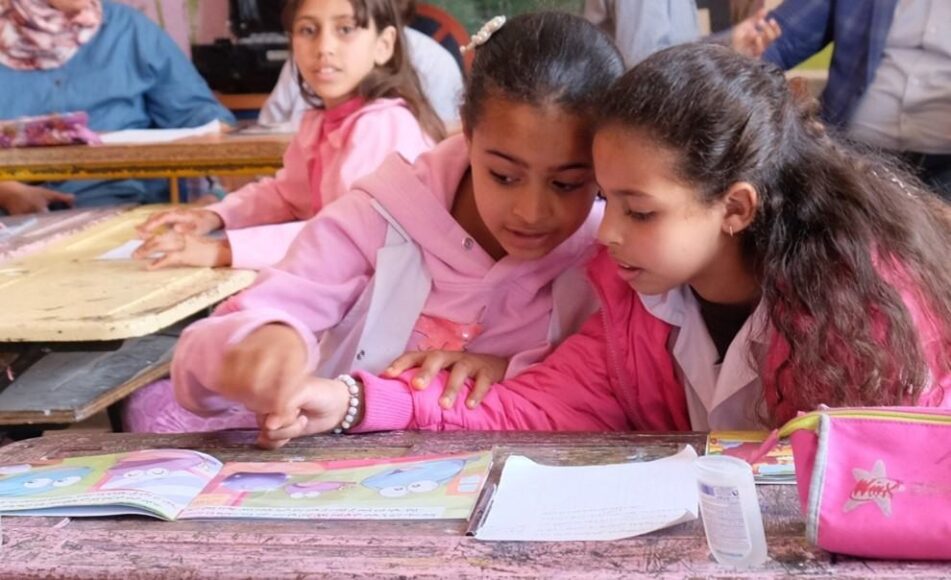Over 4.4 million one through six graders throughout 24,000 schools are expected to build their reading and comprehension skills using the updated curriculumKenitra, MoroccoA cooperative effort between the United States and Morocco to reimagine the teaching of literacy in the early grades reached a major milestone this spring, as educators throughout Morocco convened to finalize a revised Arabic Language curriculum for grades 1 through 6.
When U.S. Agency for International Development and Creative Associates International delivered the final curriculum to Morocco’s Ministry of National Education in late June, it was the culmination of seven years of intensive cooperation between the U.S. and Morocco in a series of projects called Reading for Success: Small Scale Experimentation and National Program for Reading.
A response to Morocco’s longstanding struggle with reading performance, the Reading for Success projects aimed to give teachers what they need to accelerate children’s acquisition of reading and writing through highly interactive activities such as storytelling, movement and role-playing.

“I am thrilled that we finally reached this significant milestone of producing a new Arabic language curriculum for primary schools which corresponds to the new vision for the education system,” the Ministry’s Curriculum Director, Fouad Chafiqi, said during the workshop on June 17. “I consider this a real accomplishment comparing how the curriculum was in 2017 and how it turned out.”
In late July, Morocco’s Minister of Education, Saaid Amzazi, approved the curriculum and decreed that it will be used nationwide starting in fall 2021.
After a research phase, Reading for Success activities launched in 2015 with a pilot project, Reading for Success-Small-Scale Experimentation, that tested a phonics-based approach to strengthen reading in first and second grade in four regions of Morocco.
The Reading for Success program then expanded the pilot to third and fourth grade, before scaling up the revised curriculum nationwide for grades 1 through 4 in the 2018-2019 and 2019-2020 school years.
Reaching out at the local level, the project empowered principals and teachers to take leadership in literacy. As teachers reported that the new materials and methods were clearly effective at raising students’ reading fluency, the Ministry asked U.S. Agency for International Development and Creative to expand Reading for Success to include fifth and sixth grade. The revised curriculum for grades 5 and 6 was scaled up nationwide at the beginning of 2020-2021 school year.
More than 1,000 inspectors were prepared as trainers and then trained over 93,000 teachers in public and private elementary schools throughout Morocco. The program institutionalized the new reading approach by integrating it into pre-service training for teachers and teacher trainers.
Lamia Fares, who trained teachers in Morocco’s Souss-Massa region, says she emphasizes to teachers that they can ignite students’ enthusiasm if they use methods that are original and fun.
“Personally, I tried to convey this experience in the context of teacher training and trained my teacher-trainees on how to teach reading in innovative, enjoyable, and effective ways,” Fares said. “In most follow-up meetings, the teachers expressed their satisfaction with the new approach and the impressive results achieved by their students. More students have become masters of reading and oral communication in standard Arabic. They participate enthusiastically in story reading sessions and even produce remarkable writing texts.”
Harnessing the reach of technology, the program is equipping the Ministry to design massive online open courses to introduce the new curriculum to both future teacher candidates and practicing teachers through pre-service and in-service training.
The program also provided 100 supplemental reading materials through a digital library and engaged sign language interpreters to produce 600 Moroccan Sign Language video lessons reaching 4,000 deaf and hard-of-hearing students.
At the end of the project, over 4.4 million first- through sixth- graders in more than 24,000 public and private schools are expected to have improved reading and comprehension skills using the updated materials.
At the national validation workshop in June 2021, which included the national curriculum director and representatives of U.S. Agency for International Development and Creative, academic inspectors from all 12 of Morocco’s regions reviewed and provided final recommendations on the grade 1 to 6 curriculum.
The culmination of the Reading for Success program, the workshop also reflected the authentically collaborative nature of the project, which engaged language and pedagogy experts and educators in testing and refining the curriculum.
Looking to the future, the program places Morocco in a better position to track the performance of students and schools.
The program trained first through fourth-grade teachers in setting benchmarks, and 66 evaluation experts were trained to build the capacity of Ministry staff in designing and conducting evaluations.
Mounya El-Asri contributed to this article.